Shows

Expedition in die ForschungWie startete das Leben? – mit Bill Martin
Prof. William „Bill“ Martin, Foto: Heinrich-Heine-Universität Düsseldorf
Prof. Bill Martin erforscht an der Universität Düsseldorf den Ursprung des Lebens. Für Biologen ist das Leben eine einzige, große chemische Reaktion. Und die muss irgendwann, irgendwo, irgendwie gestartet sein – und zwar bevor es Leben gab. Nun sucht Prof. Martin gemeinsam mit seinem Team und Kooperationspartner*Innen nach den Umweltbedingungen, in denen das passiert sein könnte.
Bill Martin, ursprünglich aus Texas in den USA, erzählte uns auf Englisch, wie er auf diesen Forschungspfad gekommen ist, und was er und die anderen beteiligten For...
2022-04-3047 min
Expedition in die ForschungDas Menschengemachte Massensterben – mit Thomas Neubauer
Wie schnell rotten wir Tierarten aus? Diese Frage haben sich Thomas Neubauer und seine Kooperationspartner gestellt. Die Ergebnisse reihen sich in eine lange Liste wissenschaftlicher Veröffentlichungen ein, die uns vor dem rapiden Verlust der Artenvielfalt – der „Biodiversität“ warnen. Die Biodiversitätskrise – das sechste Massensterben – ist in vollem Gange.
Paläobiologe Dr. Thomas A. Neubauer Justus Liebig Universität, Gießen
Die Arbeit konzentriert sich auf das Artensterben in zentral wichtigen Ökosystemen: die Süßgewässer in Europa. Sie vergleicht die Aussterberaten des letzten großen Massensterbens vor 66 Millionen Jahren mit dem heutigen, menschengemachten Artensterben.
Ko-Moderatoren...
2021-09-1747 min
Expedition in die ForschungWas bedeutet Plastik im Meer für die Tiere? Was bedeutet Plastik im Meer für die Tiere? Foto: Thea Hamm auf einer Expedition (Quelle: privat) 180 Millionen Tonnen Plastik schwimmen etwa in den Weltmeeren. Meeresbiologin Thea Hamm erforscht am GEOMAR was diese Umweltverschmutzung mit den Tieren macht. In den Kurzmeldungen geht es um den Lebensraum von Menschenaffen in Westafrika, den Magnetsinn von Vögeln und eine energieschonende Methode, sauberes Trinkwasser aus der Luft zu gewinnen. Co-Hosts: Dennis Eckmeier und Bart Geurten ...
2021-08-0644 min
Expedition in die ForschungWas macht Mikroplastik mit den Tieren im Meer? – mit Thea Hamm
Foto: Thea Hamm auf einer Expedition (Quelle: privat)
180 Millionen Tonnen Plastik schwimmen etwa in den Weltmeeren. Meeresbiologin Thea Hamm erforscht am GEOMAR was diese Umweltverschmutzung mit den Tieren macht. In den Kurzmeldungen geht es um den Lebensraum von Menschenaffen in Westafrika, den Magnetsinn von Vögeln und eine energieschonende Methode, sauberes Trinkwasser aus der Luft zu gewinnen.
Co-Hosts: Dennis Eckmeier und Bart Geurten
Transkript zum Mitlesen
Anhören auf YouTube
Unterstütze unsere Arbeit mit einem Trinkgeld:IBAN: DE82 1001 0010 0206 8851 38 (Dennis Eckmeier, Postbank) oder PayPal
Kapitel
00:00 Intro01:58 Meldungen aus...
2021-08-0644 min
Expedition in die ForschungWas bedeutet Plastik im Meer für die Tiere? 180 Millionen Tonnen Plastik schwimmen etwa in den Weltmeeren. Meeresbiologin Thea Hamm erforscht am GEOMAR was diese Umweltverschmutzung mit den Tieren macht. In den Kurzmeldungen geht es um den Lebensraum von Menschenaffen in Westafrika, den Magnetsinn von Vögeln und eine energieschonende Methode, sauberes Trinkwasser aus der Luft zu gewinnen. Foto: Thea Hamm auf einer Expedition (Quelle: privat) Co-Hosts: Dennis Eckmeier und Bart Geurten Transkript zum Mitlesen Folge auf Y...
2021-07-3044 min
Expedition in die ForschungImplantate aus Nanopartikeln – Gesundheits-Tracker der Zukunft? – mit Carsten Sönnichsen
Ständige Blutentnahmen machen chronisch Erkrankten oft das Leben zusätzlich schwer. Viele Diabetes-Erkrankte, zum Beispiel, müssen sich teils über Jahrzehnte täglich für die Blutzuckermessung stechen.
Nanobiotechnologe Carsten Sönnichsen hat eine faszinierende Idee, wie man den Menschen diese kleine Tortur ersparen könnte. Er hat mir erzählt, wie man aus Goldnanopartikel Bio-Sensoren macht, die man unter die Haut implantiert und von außen auslesen kann. Außerdem erfahren wir, wie er gemeinsam mit seiner Arbeitsgruppe an der Uni Mainz die ersten erfolgreichen Tests durchgeführt hat.
Prof. Carsten Sönnichsen, Uni MainzBilq...
2021-07-091h 02
Science for Progress52 B&D Online Teaching, SciComm, and the Populist Fringes
My co-host Bart Geurten and I had a rather spontaneous conversation, again. We talk about remote teaching, how science communication and science journalism could be supported by the public, and speculate about how the political fringe might be missing a sense of belonging.
Following a catch-up about our lives in the pandemic, we talk about taking lectures online. Should we do it? Are there circumstances when it makes sense? Or does it remove important social interactions among students?
We then talk...
2020-08-0338 min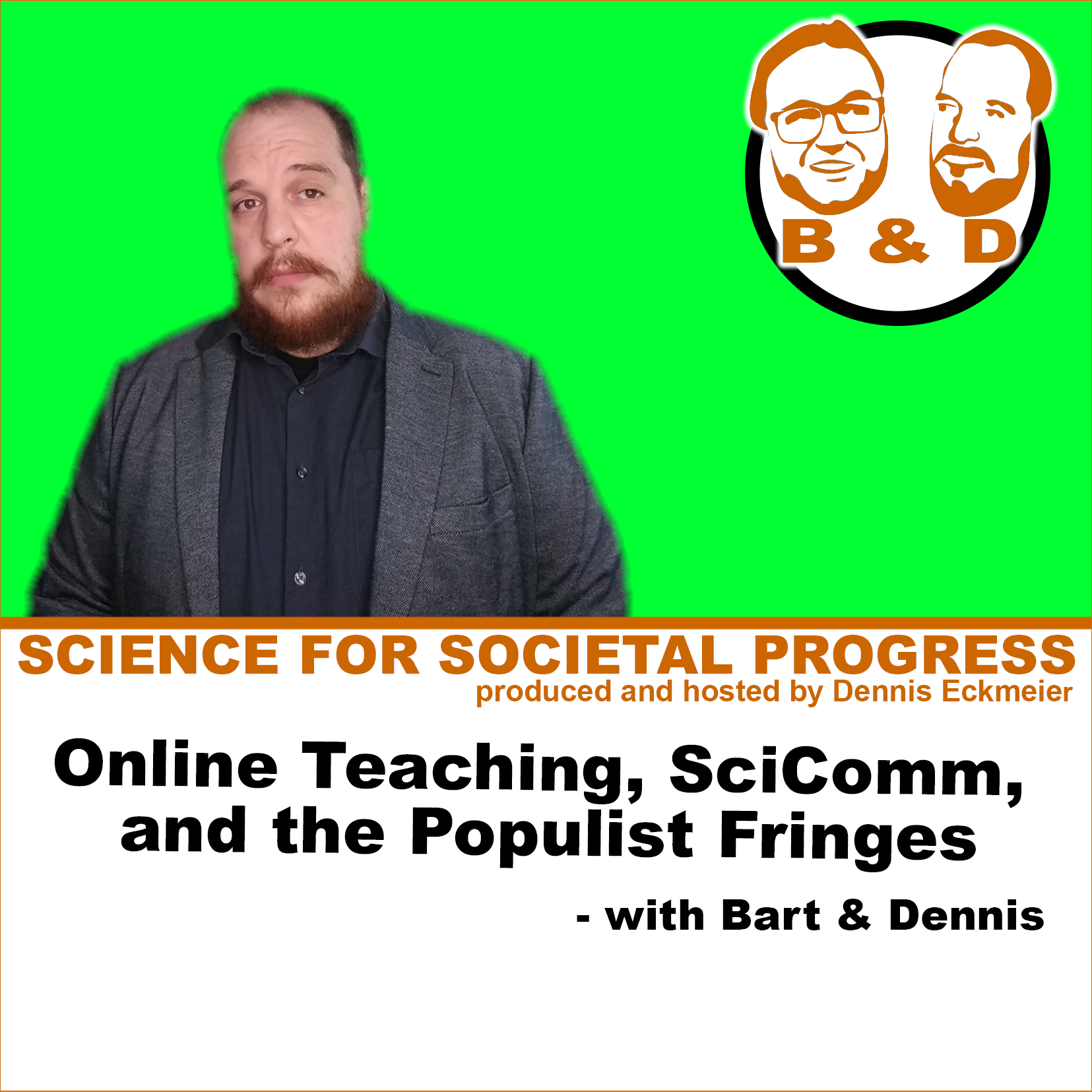
Science for Progress52 B&D Online Teaching, SciComm, and the Populist FringesMy co-host Bart Geurten and I had a rather spontaneous conversation, again. We talk about remote teaching, how science communication and science journalism could be supported by the public, and speculate about how the political fringe might be missing a sense of belonging. Following a catch-up about our lives in the pandemic, we talk about […]
The post 52 B&D Online Teaching, SciComm, and the Populist Fringes appeared first on Science for Progress.
2020-08-0338 min
Science for Progress52 B&D Online Teaching, SciComm, and the Populist FringesMy co-host Bart Geurten and I had a rather spontaneous conversation, again. We talk about remote teaching, how science communication and science journalism could be supported by the public, and speculate about how the political fringe might be missing a sense of belonging.
Following a catch-up about our lives in the pandemic, we talk about taking lectures online. Should we do it? Are there circumstances when it makes sense? Or does it remove important social interactions among students?
We then talk about science communication. There was a hearing in the German Bundestag about how the parliament could install a funding...
2020-08-0300 min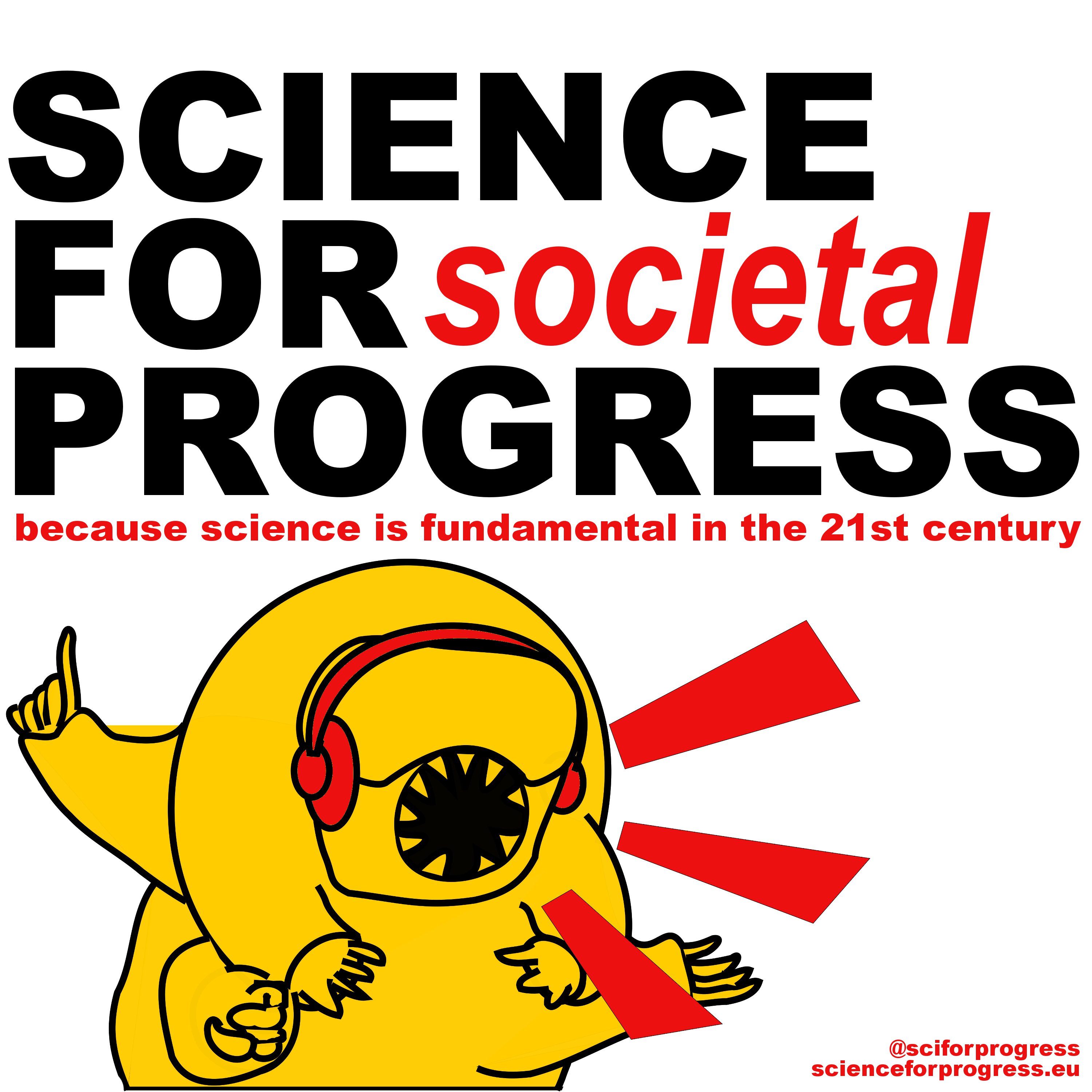
Science for Progress49 Times of Crisis – Conspiracy Myths and SciComm – with B&DFor this episode, Bart and I had a rather spontaneous chat about conspiracy beliefs and science communication during the COVID-19 pandemic.
Worldwide conspiracy myths about SARS-CoV-2 appear to be on the rise, and conspiracy narrators team up with other cranks in demonstrations - 'hygiene demos' they call it in Germany. And the far right is taking advantage of them.
Listen to the Full Conversation on Patreon!
At the same time, science communication is at the center of the social discussions surrounding COVID-19. Several virologists have reached a certain celebrity status, which is having a lot of ... interesting ... effects. At the...
2020-06-0100 min
Science for Progress49 Times of Crisis – Conspiracy Myths and SciComm – with B&D
For this episode, Bart and I had a rather spontaneous chat about conspiracy beliefs and science communication during the COVID-19 pandemic.
Worldwide conspiracy myths about SARS-CoV-2 appear to be on the rise, and conspiracy narrators team up with other cranks in demonstrations - 'hygiene demos' they call it in Germany. And the far right is taking advantage of them.
Listen to the Full Conversation on Patreon!
At the same time, science communication is at the center of the social...
2020-06-0141 min
Science for Progress33 Mandatory Open Access & E****ier – with Bart & Dennis
Photo by Miriam Berger and Bart Geurten
We are back from the summer break! So, we resume the “Bart and Dennis” Talk format!
Bart and I briefly talk about Bart’s research, because he just published an article! And it appeared in a journal that is actually quite good, but it is pay-walled and published by Elsevier.
We then talk about the upcoming Open Science mandate that cOAlition S is trying to establish in Europe. cOAlition S includes some of the biggest funding agencies in Europe, like the We...
2019-09-0132 min
Science for Progress33 Mandatory Open Access & E****ier – with Bart & DennisPhoto by Miriam Berger and Bart Geurten
We are back from the summer break! So, we resume the “Bart and Dennis” Talk format!
Bart and I briefly talk about Bart’s research, because he just published an article! And it appeared in a journal that is actually quite good, but it is pay-walled and published by Elsevier.
We then talk about the upcoming Open Science mandate that cOAlition S is trying to establish in Europe. cOAlition S includes some of the biggest funding agencies in Europe, like the Wellcome Trust and the European Research Council. Yet, a lot of scientists seem t...
2019-09-0100 min
Science for Progress28 B&D: The Rise of the Greens in the EU, Homeopathy, & Postdocs
Once a month Bart Geurten and I talk about current topics in the Bart and Dennis (“B&D”) series. This time we talk about the success of the Greens in the EU parliament elections, homeopathy, and postdocs.
Announcement
And we have a big announcement: On July 7th we will do a live episode on YouTube! For the show we want to play a little game. And for this to work, we need you cooperation! Send us your weirdest/funniest parascience or pseudoscience stories or soundbites! You can...
2019-06-0940 min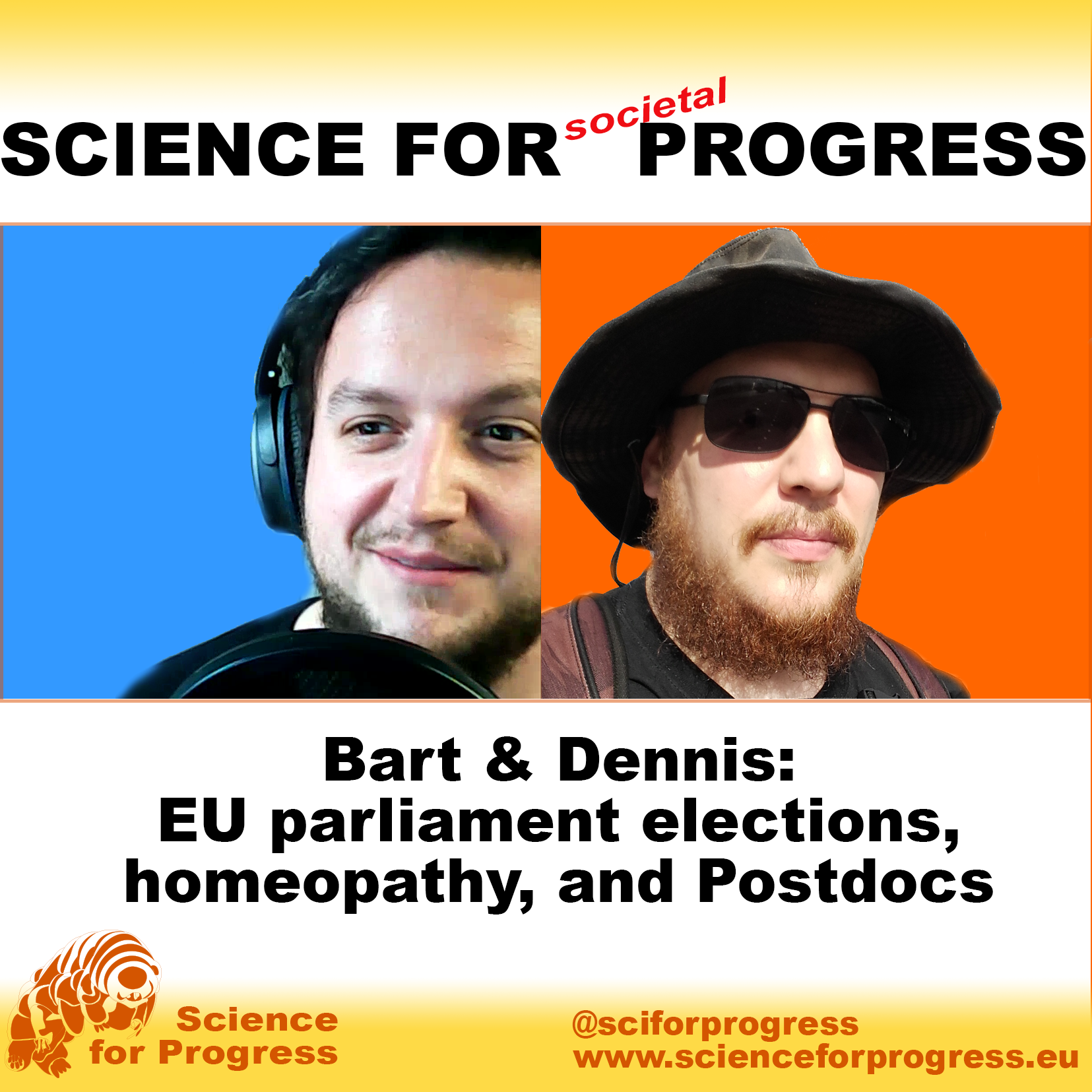
Science for Progress28 B&D: The Rise of the Greens in the EU, Homeopathy, & PostdocsOnce a month Bart Geurten and I talk about current topics in the Bart and Dennis (“B&D”) series. This time we talk about the success of the Greens in the EU parliament elections, homeopathy, and postdocs.
Announcement
And we have a big announcement: On July 7th we will do a live episode on YouTube! For the show we want to play a little game. And for this to work, we need you cooperation! Send us your weirdest/funniest parascience or pseudoscience stories or soundbites! You can support either Bart or Dennis by sending your story to bart@scienceforprorgess.eu, or d...
2019-06-0900 min
Science for Progress16 B&D: CRISPR Babies
At the end of November 2018, Chinese scientist He Jiankui announced that he had genetically modified human embryos which were then brought to term. The resulting twin sisters appear to be healthy. But this experiment was not greeted with enthusiasm by the scientific community.
The critique attacks every aspect of the experiment: the treatment’s medical necessity, the reasoning behind the treatment approach, the way it was conducted, the ethical implications, and it also wasn’t legal.
Listen to the Full Conversation on Patreon!
2018-12-2337 min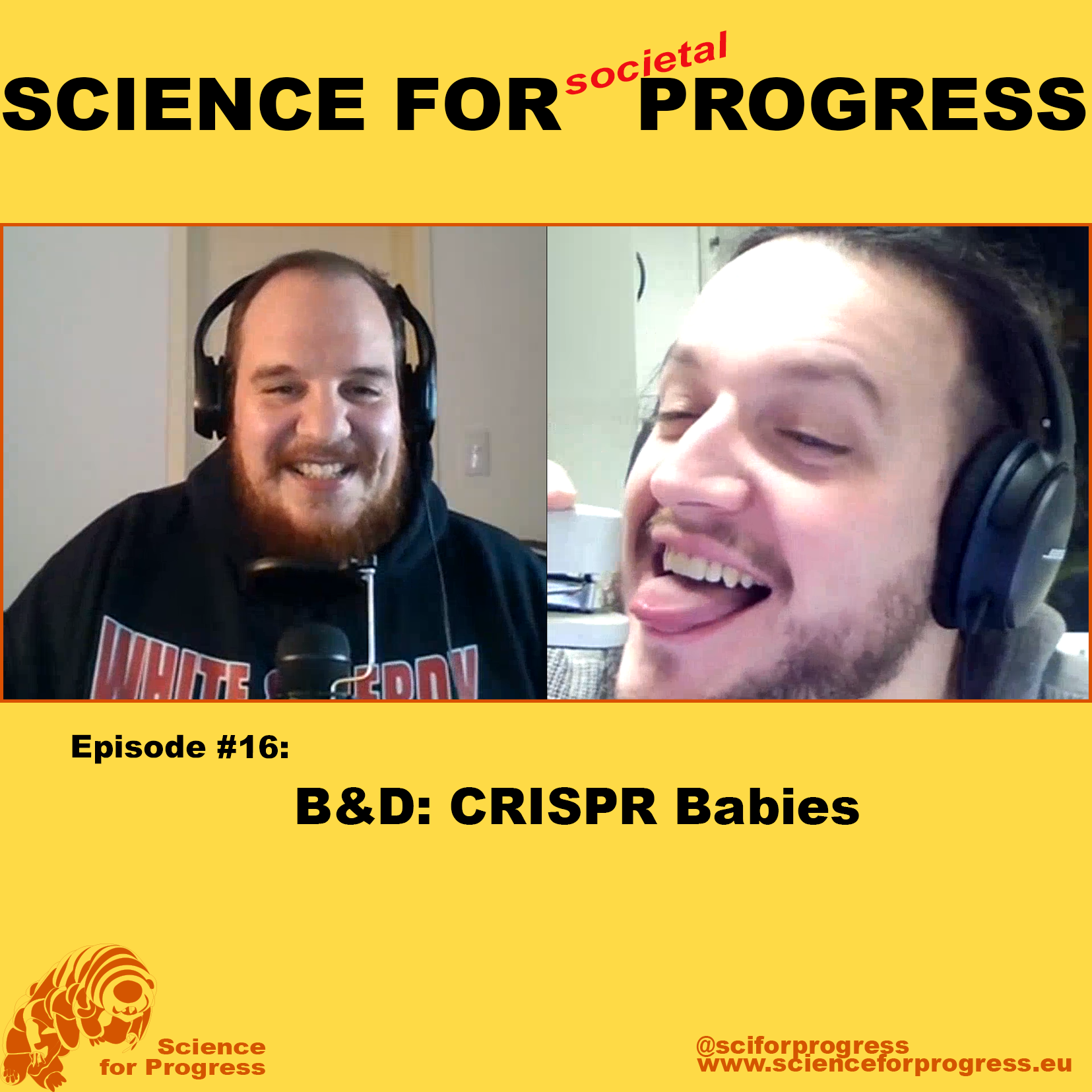
Science for Progress16 B&D: CRISPR BabiesAt the end of November 2018, Chinese scientist He Jiankui announced that he had genetically modified human embryos which were then brought to term. The resulting twin sisters appear to be healthy. But this experiment was not greeted with enthusiasm by the scientific community.
The critique attacks every aspect of the experiment: the treatment’s medical necessity, the reasoning behind the treatment approach, the way it was conducted, the ethical implications, and it also wasn’t legal.
Listen to the Full Conversation on Patreon!
He Jiankui was aware that he was doing something the public and the scientific community would not agre...
2018-12-2300 min
Science for Societal Progress14 B&D: Journals, SciComm, and GMOsOnce a month I sit down with my friend and co-host Bart Geurten. We talk about things within and around academia, and exchange opinions on earlier episodes. In this episode, we first talk about the concept of overlay journals in the context of the newly founded community based journal “Neurons, Behavior, Data Analysis, and Theory”. NBDT is a journal for computational neuroscience, and it’s community lead, completely free, open, and not for profit. We then talk about the role researchers should play in the dissemination of science to the public. This discussion has been on the...
2018-11-2538 min
Science for Progress14 B&D: Journals, SciComm, and GMOs
Once a month I sit down with my friend and co-host Bart Geurten. We talk about things within and around academia, and exchange opinions on earlier episodes.
In this episode, we first talk about the concept of overlay journals in the context of the newly founded community based journal "Neurons, Behavior, Data Analysis, and Theory". NBDT is a journal for computational neuroscience, and it's community lead, completely free, open, and not for profit.
We then talk about the role researchers should play in the dissemination of...
2018-11-2538 min
Science for Progress14 B&D: Journals, SciComm, and GMOsOnce a month I sit down with my friend and co-host Bart Geurten. We talk about things within and around academia, and exchange opinions on earlier episodes.
In this episode, we first talk about the concept of overlay journals in the context of the newly founded community based journal "Neurons, Behavior, Data Analysis, and Theory". NBDT is a journal for computational neuroscience, and it's community lead, completely free, open, and not for profit.
We then talk about the role researchers should play in the dissemination of science to the public. This discussion has been on the internet for a while...
2018-11-2500 min
Science for Societal Progress12 Q&A Meritocracy in AcademiaThis episode is the first ‘Q&A’ episode, where my new co-host Dr. Bart Geurten (see episode 8) and I talk about what’s new in academia. Our conversations are free form and may lead us astray here and there. We discuss the concept of ‘merit’ in the natural sciences. And we begin with a quick recap on episode 9, where I talked to Dr. Björn Brembs about the Journal Impact Factor (JIF). The JIF is a metric designed to measure the impact a journal had in the scientific community. There are many problems with how JIFs are generated...
2018-10-2836 min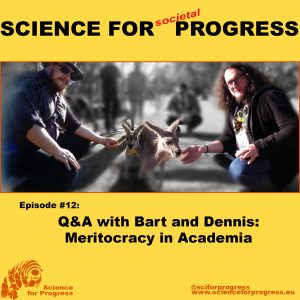
Science for Progress12 Q&A Meritocracy in AcademiaThis episode is the first 'Q&A' episode, where my new co-host Dr. Bart Geurten (see episode 8) and I talk about what's new in academia. Our conversations are free form and may lead us astray here and there.
We discuss the concept of 'merit' in the natural sciences. And we begin with a quick recap on episode 9, where I talked to Dr. Björn Brembs about the Journal Impact Factor (JIF). The JIF is a metric designed to measure the impact a journal had in the scientific community. There are many problems with how JIFs are generated. What is even w...
2018-10-2800 min
Science for Progress12 Q&A Meritocracy in Academia
This episode is the first 'Q&A' episode, where my new co-host Dr. Bart Geurten (see episode 8) and I talk about what's new in academia. Our conversations are free form and may lead us astray here and there.
We discuss the concept of 'merit' in the natural sciences. And we begin with a quick recap on episode 9, where I talked to Dr. Björn Brembs about the Journal Impact Factor (JIF). The JIF is a metric designed to measure the impact a journal had in the scientific community. There are m...
2018-10-2836 min
Science for Societal Progress#8 Cognitive Biases in Science and Society – with Dr. Bart GeurtenScience compensates for the shortcomings of human cognition. It allows us to apply methods of investigation that are independent of our own subjective notions and irrationality. As a result we have overcome common sense, traditional beliefs, and other misconceptions through thorough investigation. We even describe and utilize phenomena that are as incomprehensible as quantum mechanics, which defies our everyday experience in unimaginable ways. There is, however, a real struggle, here. Just like our brain perceives the non-existent ‘Kanizsa’s Triangle’ (picture on the left), we make certain identifiable mistakes in cognitive thinking, too. This can really impact...
2018-09-0235 min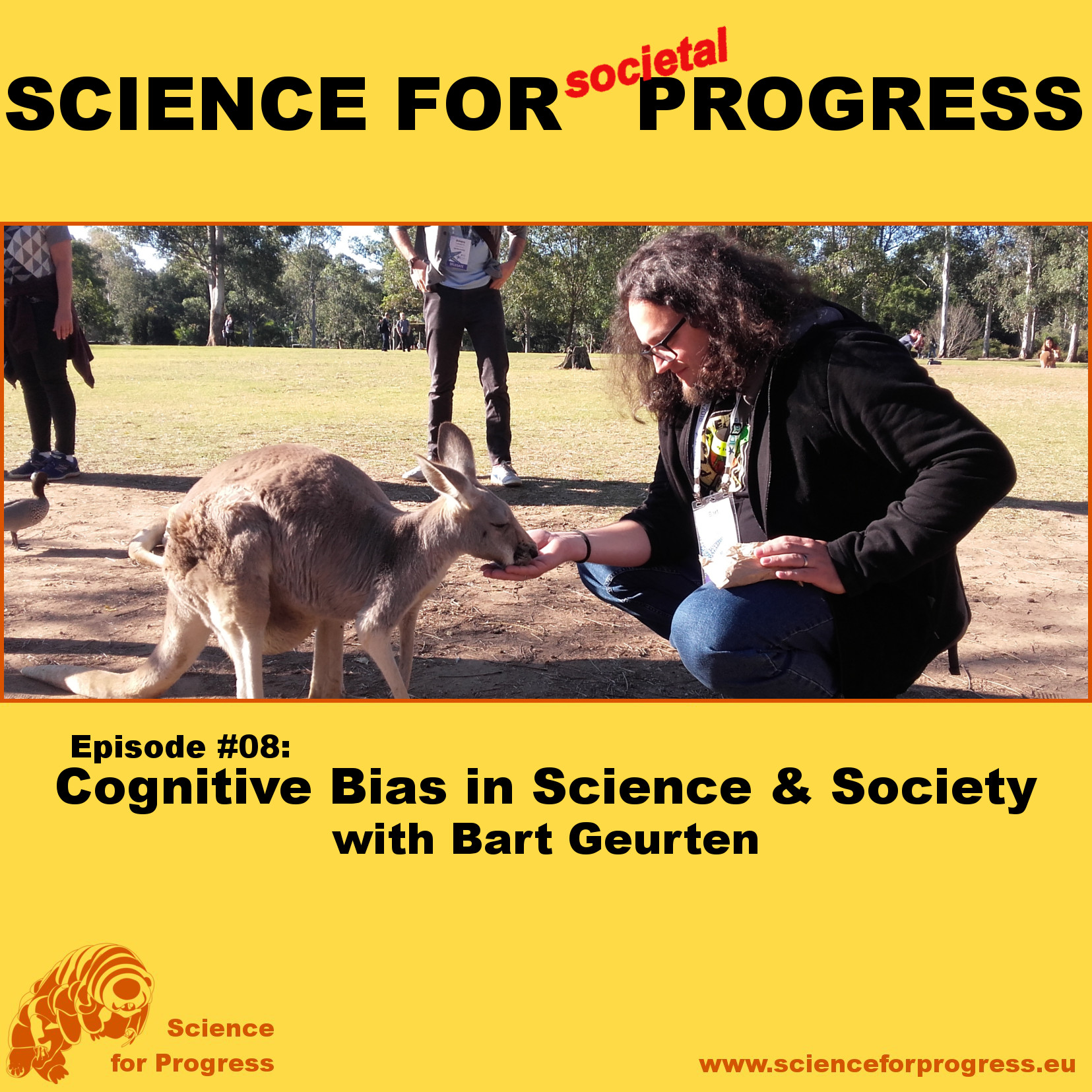
Science for Progress#8 Cognitive Biases in Science and Society – with Dr. Bart GeurtenScience compensates for the shortcomings of human cognition. It allows us to apply methods of investigation that are independent of our own subjective notions and irrationality. As a result we have overcome common sense, traditional beliefs, and other misconceptions through thorough investigation. We even describe and utilize phenomena that are as incomprehensible as quantum mechanics, which defies our everyday experience in unimaginable ways.
There is, however, a real struggle, here. Just like our brain perceives the non-existent 'Kanizsa's Triangle' (picture on the left), we make certain identifiable mistakes in cognitive thinking, too. This can really impact the way science is...
2018-09-0200 min
Science for Progress#8 Cognitive Biases in Science and Society – with Dr. Bart GeurtenScience compensates for the shortcomings of human cognition. It allows us to apply methods of investigation that are independent of our own subjective notions and irrationality. As a result we have overcome common sense, traditional beliefs, and other misconceptions through thorough investigation. We even describe and utilize phenomena that are as incomprehensible as quantum mechanics, which defies our everyday experience in unimaginable ways.
There is, however, a real struggle, here. Just like our brain perceives the non-existent 'Kanizsa's Triangle' (picture on the left), we make certain identifiable mistakes in cognitive thinking, too. This can really impact the...
2018-09-0235 min